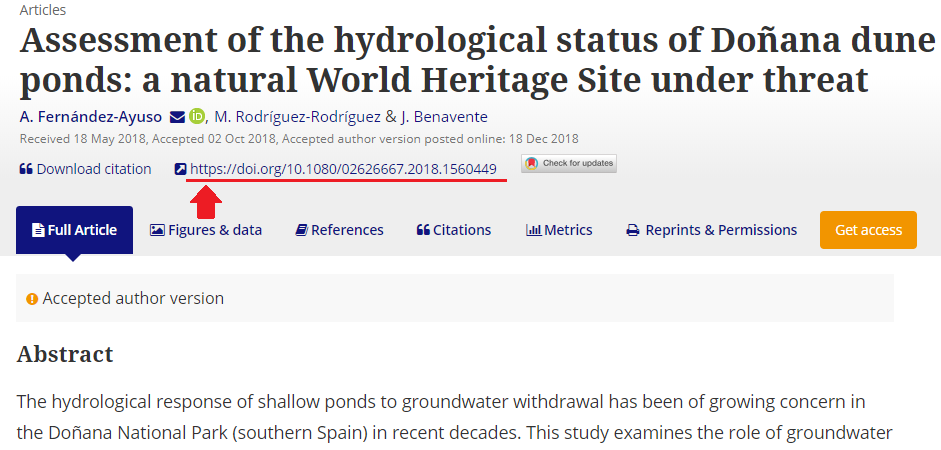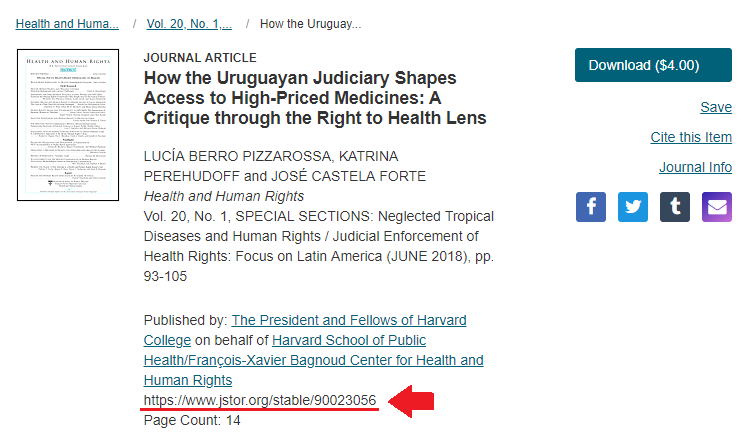What is a DOI? | Finding and Using Digital Object Identifiers
A DOI (Digital Object Identifier) is a unique and never-changing string assigned to online (journal) articles, books, and other works. DOIs make it easier to retrieve works, which is why citation styles, like APA and MLA Style, recommend including them in citations.
You may find DOIs formatted in various ways:
- doi:10.1080/02626667.2018.1560449
- https://doi.org/10.1111/hex.12487
- https://dx.doi.org/10.1080/02626667.2018.1560449
- https://doi.org/10.1016/j.jpsychires.2017.11.014
How to find a DOI
The DOI will usually be clearly visible when you open a journal article on a database.
Examples of where to find DOIs



Note: JSTOR uses a different format, but their “stable URL” functions in the same way as a DOI.
What to do when you cannot find the DOI
If you cannot find the DOI for a journal article, you can also check Crossref. Simply paste the relevant information into the “Search Metadata” box to find the DOI. If the DOI does not exist here, the article most likely does not have one; in this case, use a URL instead.
Here's why students love Scribbr's proofreading services
APA Style guidelines for using DOIs
APA Style guidelines state that DOIs should be included whenever they’re available. In practice, almost all journal articles and most academic books have a DOI assigned to them.
You can find the DOI on the first page of the article or copyright page of a book. Omit the DOI from the APA citation if you cannot find it.
Formatting DOIs in APA Style
DOIs are included at the end of the APA reference entry. In the 6th edition of the APA publication manual, DOIs can be preceded by the label “doi:” or formatted as URLs. In the 7th edition, DOIs should be formatted as URLs with ‘https://doi.org/’ preceding the DOI.
- APA 6th edition: doi:10.1177/0269881118806297 or https://doi.org/10.1177/0269881118806297
- APA 7th edition: https://doi.org/10.1177/0269881118806297
APA citation examples with DOI
- Fardouly, J., & Vartanian, L. R. (2016). Social media and body image concerns: Current research and future directions. Current Opinion in Psychology, 9, 1–5. https://doi.org/10.1016/j.copsyc.2015.09.005
- Sustersic, M., Gauchet, A., Foote, A., & Bosson, J.-L. (2016). How best to use and evaluate Patient Information Leaflets given during a consultation: a systematic review of literature reviews. Health Expectations, 20(4), 531–542. https://doi.org/10.1111/hex.12487
Generate accurate APA citations with Scribbr
MLA Style guidelines for using DOIs
MLA recommends using the format doi:10.1177/0269881118806297.
Generate accurate MLA citations with Scribbr
Chicago Style guidelines for using DOIs
In Chicago style, the format https://doi.org/10.1177/0269881118806297 is preferred.
Here's why students love Scribbr's proofreading services
Frequently asked questions about DOIs
- Why are DOIs important?
-
A DOI is a unique identifier for a digital document. DOIs are important in academic citation because they are more permanent than URLs, ensuring that your reader can reliably locate the source.
Journal articles and ebooks can often be found on multiple different websites and databases. The URL of the page where an article is hosted can be changed or removed over time, but a DOI is linked to the specific document and never changes.
- How do I find the DOI of an article?
-
The DOI is usually clearly visible when you open a journal article on an academic database. It is often listed near the publication date, and includes “doi.org” or “DOI:”. If the database has a “cite this article” button, this should also produce a citation with the DOI included.
If you can’t find the DOI, you can search on Crossref using information like the author, the article title, and the journal name.
- How do I format a DOI in APA Style?
-
Include the DOI at the very end of the APA reference entry. If you’re using the 6th edition APA guidelines, the DOI is preceded by the label “doi:”. In the 7th edition, the DOI is preceded by ‘https://doi.org/’.
- 6th edition: doi:10.1177/0894439316660340
- 7th edition: https://doi.org/10.1177/0894439316660340
APA citation example (7th edition)
Hawi, N. S., & Samaha, M. (2016). The relations among social media addiction, self-esteem, and life satisfaction in university students. Social Science Computer Review, 35(5), 576–586. https://doi.org/10.1177/0894439316660340
- When should I include a DOI or URL in an APA journal citation?
-
In an APA journal citation, if a DOI (digital object identifier) is available for an article, always include it.
If an article has no DOI, and you accessed it through a database or in print, just omit the DOI.
If an article has no DOI, and you accessed it through a website other than a database (for example, the journal’s own website), include a URL linking to the article.
- How do I format a DOI in MLA style?
-
In MLA style citations, format a DOI as a link, including “https://doi.org/” at the start and then the unique numerical code of the article.
https://doi.org/10.1177/1464700107078139DOIs are used mainly when citing journal articles in MLA.
Cite this Scribbr article
If you want to cite this source, you can copy and paste the citation or click the “Cite this Scribbr article” button to automatically add the citation to our free Citation Generator.
Gahan, C. (2023, February 24). What is a DOI? | Finding and Using Digital Object Identifiers. Scribbr. Retrieved November 3, 2023, from https://www.scribbr.com/citing-sources/what-is-a-doi/
